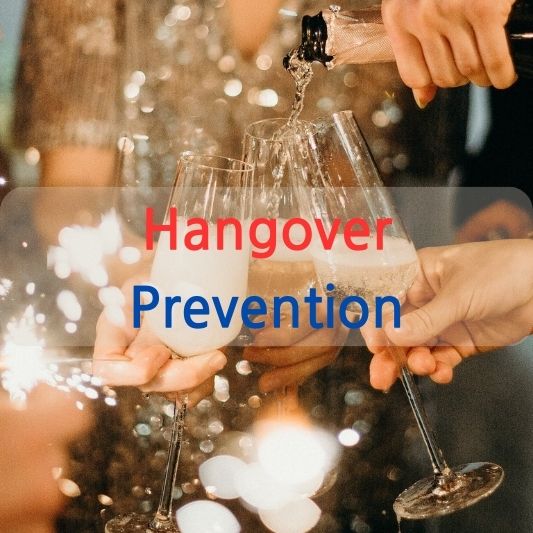Hangovers are the unpleasant symptoms that can occur after drinking too much alcohol. They can cause a variety of problems, including headaches, nausea, fatigue, and dizziness. While there is no foolproof way to prevent a hangover, there are a number of things you can do to reduce your risk or lessen the severity of your symptoms.

Here are 10 things you can do to prevent a hangover:
1.Pace yourself.
The most important thing you can do to prevent a hangover is to pace yourself when you drink. Alcohol takes time to metabolize, so if you drink too much too quickly, your body will not be able to process it all and you will be more likely to experience a hangover.
2.Eat before and while you drink.
Eating a meal before or while you drink will help to slow down the absorption of alcohol into your bloodstream. This will give your body more time to metabolize the alcohol and reduce your risk of a hangover.
3.Choose clear liquors.
Clear liquors, such as vodka, gin, and tequila, are less likely to give you a hangover than dark liquors, such as whiskey, brandy, and rum. This is because dark liquors contain more congeners, which are byproducts of the fermentation process that can contribute to hangover symptoms.
4.Avoid sugary drinks.
Sugary drinks, such as soda and juice, can worsen hangover symptoms. This is because sugar can cause dehydration, which can make a hangover feel worse.
5.Drink plenty of water.
Drinking plenty of water before, during, and after drinking can help to prevent dehydration and reduce hangover symptoms.
6.Take vitamins.
Taking vitamins, such as B complex vitamins and vitamin C, can help to reduce hangover symptoms.
7.Get enough sleep.
Getting enough sleep is important for overall health and can also help to reduce hangover symptoms.
8.Eat breakfast.
Eating a healthy breakfast after drinking can help to replenish your body’s nutrients and reduce hangover symptoms.
9.Avoid caffeine.
Caffeine can worsen hangover symptoms.
10.Listen to your body.
If you start to feel sick, stop drinking. Pushing yourself to drink more will only make your hangover worse.
If you do experience a hangover, there are a number of things you can do to ease the symptoms. These include:
- Drinking plenty of fluids
- Eating bland foods
- Getting rest
- Taking over-the-counter pain relievers
If your hangover is severe, you may need to see a doctor.
conclusion
Hangovers are a common and unpleasant experience. However, by following the tips in this article, you can reduce your risk of experiencing a hangover or lessen the severity of your symptoms. If you do experience a hangover, there are a number of things you can do to ease the symptoms. Remember, the best way to prevent a hangover is to drink in moderation or not at all.
FAQ
Q: What is a hangover?
A: A hangover is a group of physical and psychological symptoms that can occur after drinking too much alcohol. Symptoms can include headache, nausea, fatigue, dizziness, sensitivity to light and noise, and dehydration.
Q: What causes hangovers?
A: The exact cause of hangovers is not fully understood, but there are a number of factors that are thought to contribute, including:
- Dehydration: Alcohol is a diuretic, which means it causes you to lose fluids. This can lead to dehydration, which can contribute to headache, fatigue, and dizziness.
- Acetaldehyde: This is a toxic byproduct of alcohol metabolism that can contribute to nausea, vomiting, and headaches.
- Congeners: These are byproducts of the fermentation process that are found in higher concentrations in dark liquors. Congeners are thought to contribute to hangover symptoms, especially headaches.
- Cytokines: These are proteins that play a role in the immune response. Alcohol may alter cytokine levels, which may contribute to the “sickness” symptoms associated with hangovers.
- Inflammation: Alcohol can cause inflammation throughout the body, which can contribute to headache, fatigue, and muscle aches.
Q: How can I prevent a hangover?
A: There is no foolproof way to prevent a hangover, but there are a number of things you can do to reduce your risk or lessen the severity of your symptoms. These include: Pace yourself: Drink slowly and don’t consume too much alcohol in a short period of time.
Eat before and while you drink: Eating food will help to slow down the absorption of alcohol into your bloodstream.
- Choose clear liquors: Clear liquors, such as vodka, gin, and tequila, are less likely to cause a hangover than dark liquors, such as whiskey, brandy, and rum.
- Avoid sugary drinks: Sugary drinks can worsen hangover symptoms.
- Drink plenty of water: Drinking plenty of water before, during, and after drinking can help to prevent dehydration.
- Take vitamins: Taking vitamins, such as B complex vitamins and vitamin C, can help to reduce hangover symptoms.
- Get enough sleep: Getting enough sleep is important for overall health and can also help to reduce hangover symptoms.
- Eat breakfast: Eating a healthy breakfast after drinking can help to replenish your body’s nutrients and reduce hangover symptoms.
- Avoid caffeine: Caffeine can worsen hangover symptoms.
- Listen to your body: If you start to feel sick, stop drinking. Pushing yourself to drink more will only make your hangover worse.
Q: What can I do to ease hangover symptoms?
A: If you do experience a hangover, there are a number of things you can do to ease the symptoms. These include: Drinking plenty of fluids
- Eating bland foods
- Getting rest
- Taking over-the-counter pain relievers
Q: When should I see a doctor for a hangover?
A: If your hangover is severe or you are experiencing any concerning symptoms, such as chest pain, vomiting blood, or confusion, you should see a doctor.
Please note that this information is not intended to be a substitute for medical advice. Always consult with a doctor before taking any medications or supplements.
Find out the price of vitamins on iHub!
